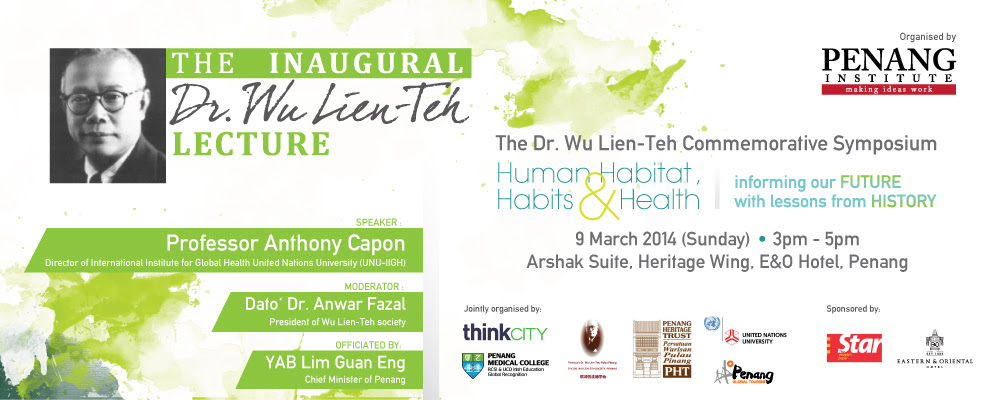Dr. Wu Lien-Teh Commemorative Symposium
The Inagural Dr. Wu Lien-Teh Lecture
“Human Habitat, Habits and Health: Informing Our Future with Lessons from History”
Officiated by YAB Lim Guan Eng, Chief Minister of Penang
9 March 2014 | 3.00 pm – 5.00 pm | Arshak suite, Heritage Wing, E & O Hotel, , Penang
Kindly register here to confirm your attendance for the above programme.
Date: 9 March 2014 (Sunday)
Time: 3.00 pm – 5.00 pm (Registration starts at 3.00 pm)
Venue: E & O Hotel, Arshak Suite, Heritage Wing
Dress code: Smart Casual
Dr Wu Lien-Teh (1879 – 1960), was a global medical icon. Born in Penang, Malaysia, a student of the Penang Free School (one of the oldest English medium school in the region) and later the first Malaysian and the top medical student in the University of Cambridge where he also obtained a PhD. He was among the founders of The Anti-Opium Society, worked at the prestigious Institute of Medical Research in Kuala Lumpur, Malaysia, where there is a gallery about his great pioneering work. He moved to China in 1910 where, in the north-eastern area of China, there was an outbreak of series epidermic involving pneumonic plague. Dr Wu’s heroic medical work lead to the halting of the outbreak which could have devastated China. He is honoured as “The Plague Fighter” and has a museum in the city of Harbin in China devoted to him. He established hospitals and authored in the 1932 classic “History of Chinese Medicine”. He also founded the China Medical Association. He was nominated for the Nobel Prize for medicine in 1935, the first from Malaysia and the region. He returned to Malaysia in 1937 and worked at the town in Ipoh, Malaysia for over two decades and continued his medical and civic work. When he died in 1960 in Penang, The Times of London wrote: “the world of medicine has lost a heroic and almost legendary figure”. In the British Medical Journal, Sir Philip Manson-Bahr stated the name of Dr. Wu Lien-Teh “flashed forth as monument of devotion and courage”.
In conjunction to the Dr Wu Lien- Teh Commemorative Symposium, the Penang Institute the public policy think tank of the Penang state government is proud to host the Director of the International Institute for Global Health from United Nations University, Professor Anthony Capon who will deliver a lecture entitled “Human Habitat, habits and Health: Informing Our Future with Lessons from History”. We are therefore pleased to invite you to grace our lecture on 9 March 2014, 3.00-5.00 pm, E & O Hotel, Penang. Please note that due to limited seating, we appreciate your kind response to reserve your participation early. For registration, please click here.
About the Lecture
Human futures are urban futures. The majority of the world’s population now live in cities and, for the foreseeable future, most population growth will be in urban areas. By the middle of the 21st century, we will house an extra 2-3 billion people in the cities of the world – more than a million people every week. This urban transition provides an unparalleled opportunity to protect and promote the health of people and planetary systems through improved decision-making in cities and about them. The way people live in cities affects their health through exposure to pollution, food choices, safety, physical activity and social connectedness. The way people live in cities also affects the health of planetary systems through loss of biodiversity, changes to ecosystems, carbon emissions, climate change and environmental pollution. There is value in understanding contemporary health problems from an evolutionary perspective. Most human beings are now living in very different ways than our hunter-gatherer ancestors did. The evolutionary health principle postulates that if an animal’s environment changes in a significant way then it is likely that the animal will be less well adapted to the new conditions and will show signs of maladjustment. From an evolutionary perspective, contemporary epidemics of non-communicable diseases can be seen to arise, at least in part, from human maladaptation to the ready availability of fossil fuel energy. Human habitat – now increasingly urban – is an important determinant of human habits and health. It’s time for a re-think of urban policy, planning and management to focus on the health needs of people, in sustainable ways.
About the Speaker
Professor Anthony Capon
Anthony Capon directs the International Institute for Global Health at United Nations University. He is a public health physician and an authority on environmental health and health promotion. Since 2008, he has been working with the International Council for Science to develop a new global interdisciplinary science program on health and well being in the changing urban environment using systems approaches. Anthony Capon has extensive experience in public health research, education and policy, and has consulted in many countries and for a wide variety of organizations. He has held National Health & Medical Research Council (Australia) and World Health Organization fellowships, as well as leadership roles with the Australasian Faculty of Public Health Medicine and the International Society for Urban Health.
Programme
3.00 pm Registration
3.40 pm Welcoming Remark by YB Zairil Khir Johari, CEO, Penang Institute
3.45 pm Opening Speech by YAB Lim Guan Eng, Chief Minister of Penang
4.10 pm Inaugural Lecture by Professor Anthony Capon, Director
4.40 pm Questions and Answers
5.00 pm Adjournment
Due to limited seating, please remember to register early as registration will be closed once all the seats have been taken up. Also due to limited seating, walk-in participants may be not be entertained.
Kindly register here to confirm your attendance for the above programme.

